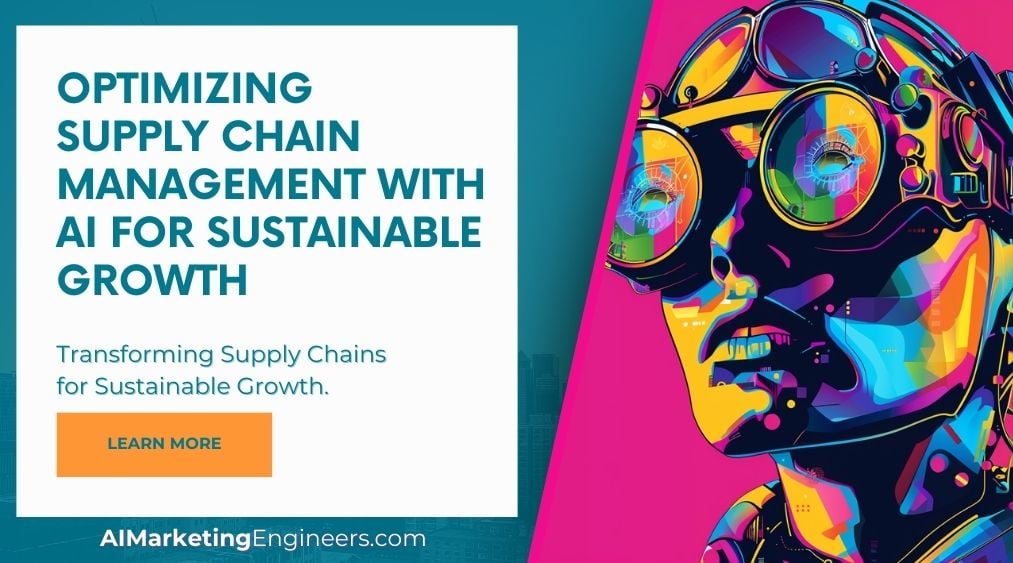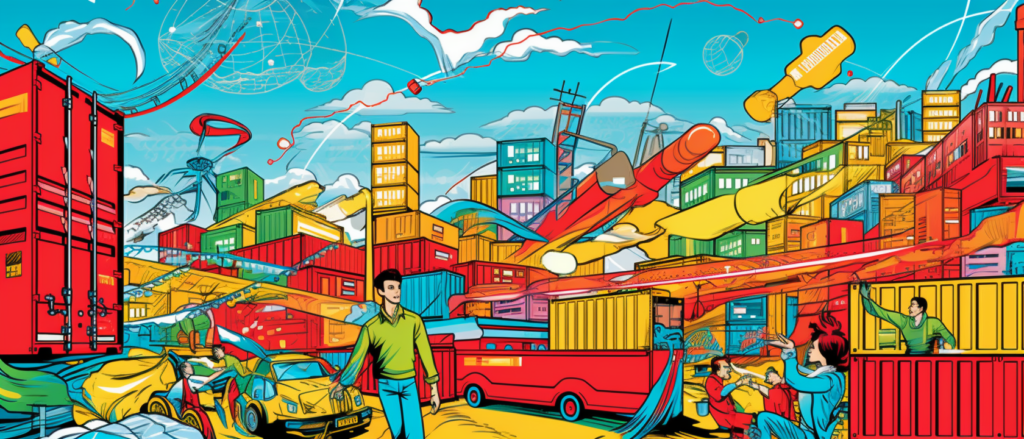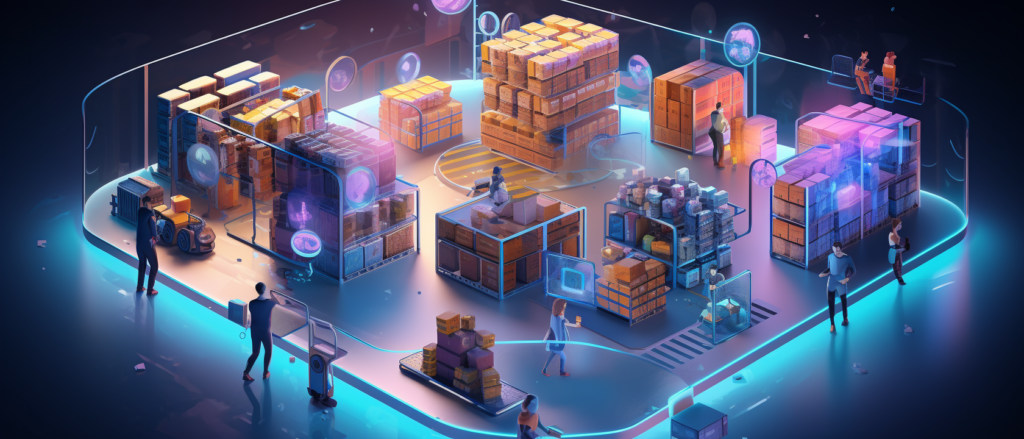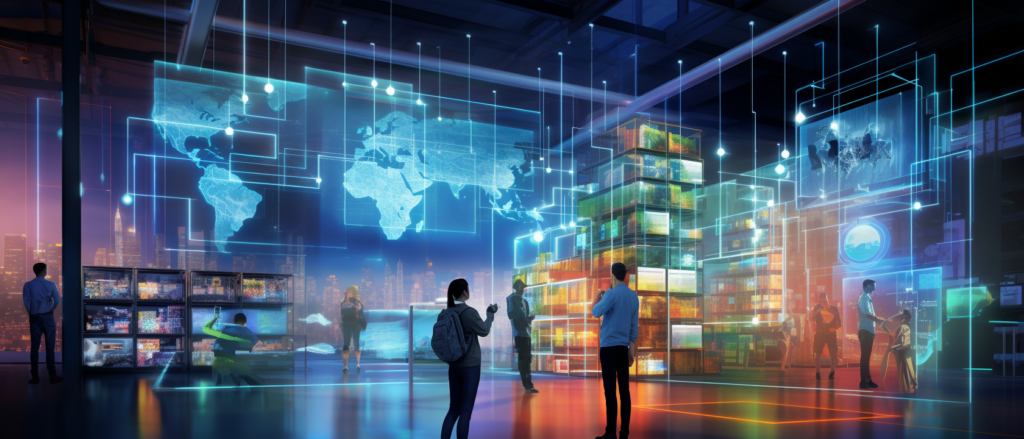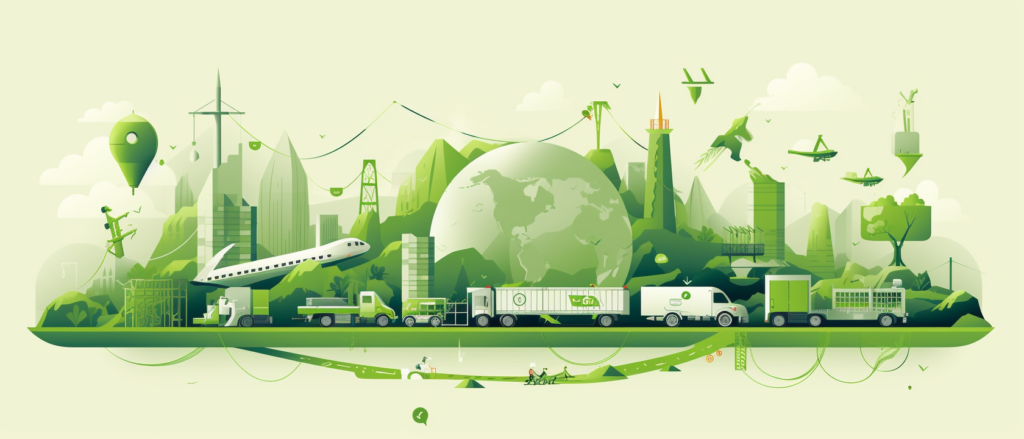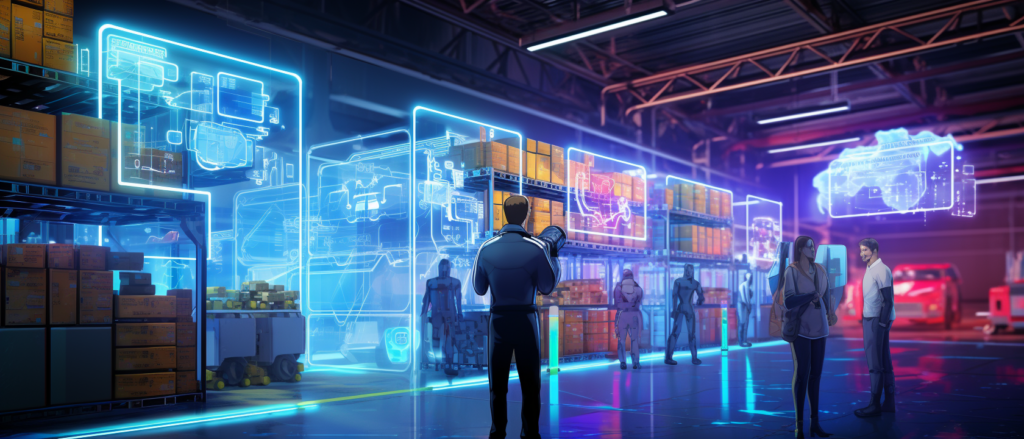Key Takeaways
✅ Enhanced Efficiency and Cost Savings: Think about how much you could save if you knew exactly how much stock to order and when? That's the beauty of AI in supply chain management – it predicts the future like a crystal ball, crunching numbers and spitting out strategies to keep your shelves stocked just right without overspending.
✅ Sustainability and Environmental Impact: Picture a world where every truck route is optimized to slash fuel use and every package is designed to minimize waste. It's not a dream; it's what AI is making happen right now, trimming the excesses off your business's environmental footprint, one byte at a time.
✅ Improved Customer Experience and Satisfaction: You know the feeling when you get exactly what you want, right when you want it? AI in supply chains is working overtime to make sure your customers keep feeling that joy. Plus, happy customers tend to stick around, fueling that sweet, sustainable growth.
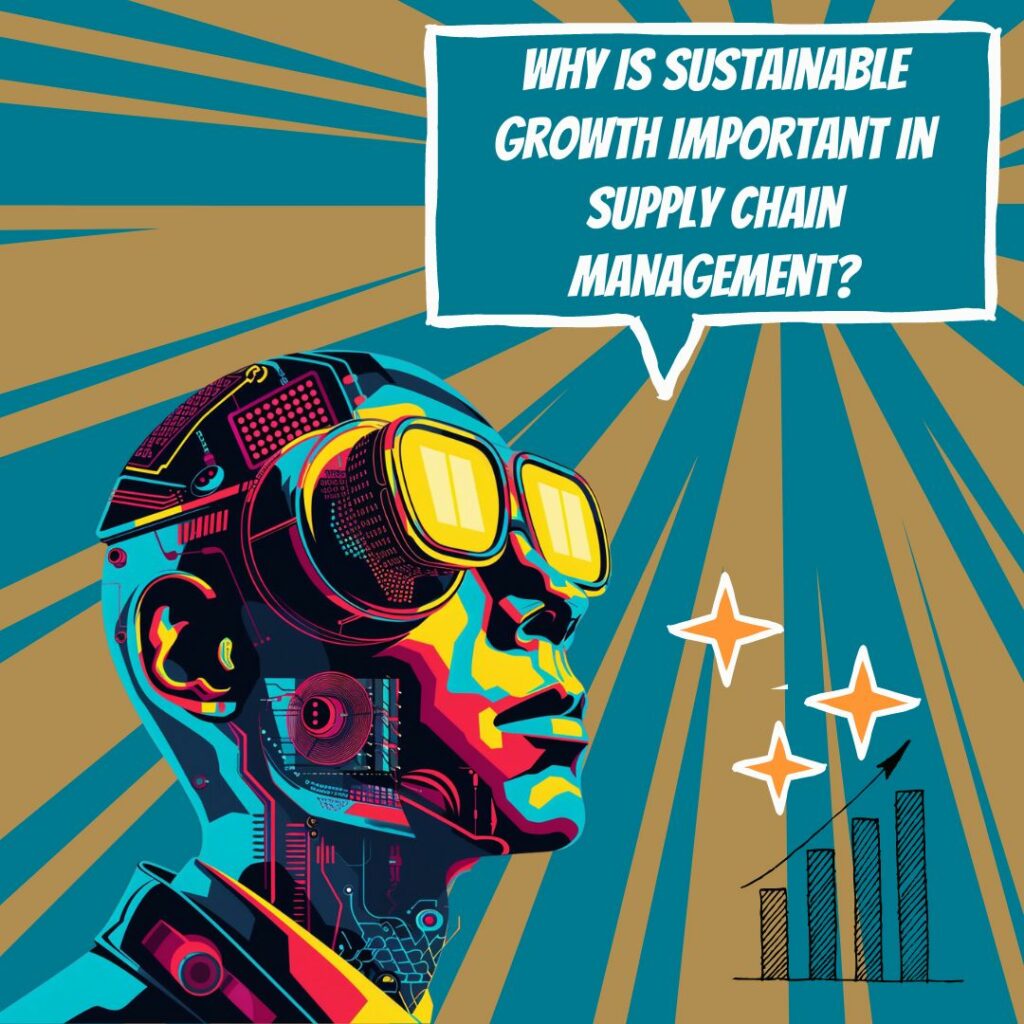
Introduction
Ever felt like you're on a wild goose chase trying to keep your business both profitable and planet-friendly? It's like trying to balance on a tightrope, isn't it? Well, what if I told you that optimizing supply chain management with a sprinkle of AI magic could be the safety net you've been hoping for? This isn't just about cutting corners to save a dime; it's about smart moves that save you time, money, and maybe even the planet.
Brace yourself for a ride through the ins and outs of supply chains where AI isn't just a cool addition—it's the MVP. We're talking about predictive power that makes Merlin look like an amateur, pinpointing exactly what your customers will want before even they know. It's not just about staying ahead of the curve; it's about drawing a whole new one.
And yes, we'll get down nitty-gritty with real examples and actionable advice that can help your business not just ride the wave but make the wave. So, stick around. By the end of this, you'll be bursting with insights on how to wield AI to make your supply chain a lean, mean, sustainable growth machine.
Top Statistics
| Statistic | Insight |
|---|---|
| Market Growth: Expected to reach $12.4 billion by 2027 from $1.8 billion in 2020 at a CAGR of 35.3%. (Source: marketsandmarkets.com) | This explosive growth signifies a major shift towards tech-driven efficiency in supply chains, opening the door for innovation and competitiveness. |
| Adoption Rates: 79% of professionals say AI will substantially change supply chain operations. (Source: supplychaindive.com) | A strong majority view AI as a game-changer, indicating how critical it is to embrace these technologies for future success. |
| Cost Savings: AI has the potential to cut forecasting errors by 50% and inventory costs by 10%. (Source: mckinsey.com) | Cost efficiency is key — businesses using AI can expect to see tangible financial benefits by minimizing waste and optimizing resources. |
| Sustainability: 67% believe AI can enhance sustainability and reduce waste. (Source: supplychaindive.com) | This statistic sheds light on AI's role as a sustainability lever, which is increasingly important to consumers and companies alike. |
| User Demographics: 61% of adopters are large enterprises, with SMEs making up 39%. (Source: marketsandmarkets.com) | While large firms lead, the growing adoption by SMEs suggests broad-based, cross-sectoral benefits of AI in supply chain management. |
Understanding Supply Chain Management and AI
Have you ever wondered why some products seem to always be in stock, no matter when you want them, while others keep you on your toes with a 'sold out' sign? Supply chain management (SCM) is the maestro behind this symphony of goods and services dancing from manufacturers to your doorstep. Now, blend it with Artificial Intelligence (AI) and you get a powerhouse duo set to take businesses to new heights. But it's not just about making things snappier; it's about nurturing a system that can grow without leaving a hefty ecological footprint. So the big question is, can AI really make SCM smarter and greener?
Challenges in Traditional Supply Chain Management
Imagine trying to solve a giant puzzle, but half the pieces are hidden or missing. That's what managing a supply chain can feel like without the right tools. Companies often grapple with slow-moving wheels, hefty bills, and all sorts of delays. These hiccups can be troublesome, especially when you're trying to be the best in the game while also not hurting the planet. It's like being stuck between a rock and a hard place. You want to innovate and keep up with the times, but those pesky inefficiencies have got you in a bind.
The Role of AI in Supply Chain Management
Here's where AI sweeps in like a superhero. Imagine having a crystal ball that tells you when your customers will clamor for more of your product, or a magic wand that organizes your warehouse in the blink of an eye. AI brings a touch of this magic to SCM with its abilities to foresee demand, smartly manage inventories, and keep an eye on shipments in real-time. Suddenly, that puzzle we talked about is looking a lot less daunting. But how does that work in real life? Well, predictive analytics and automation aren't just buzzwords; they are real tools that are reshaping how businesses foresee customer needs and handle their goods.
Benefits of AI-Optimized Supply Chain Management
The proof, as they say, is in the pudding. Companies using AI in their supply chains are seeing some sweet results. Everything is more streamlined, they're saving money, and customers are happier—because who likes to wait, right? Businesses are noticing that the pieces of the puzzle fit better when they let AI in on the action. It's not just about cutting costs; it's about increased efficiency and customer service that makes people smile. And when customers are happy, they stick around—and that's a key ingredient for sustainable growth.
AI and Sustainability in Supply Chain Management
Let's not forget about our friend, Mother Earth. As much as we love fast and efficient service, we don't want our planet to pay the price, do we? AI is stepping up by teaching supply chains to reduce waste, save energy, and source responsibly. Whether it's diminishing the carbon footprint, promoting the circular economy, or simply making the whole supply chain more transparent, AI is lending a hand in making things more sustainable. It's all about smart moves that are kinder to our world.
Implementing AI in Supply Chain Management
So, you're ready to dive in, but where do you start? Data collection is your first step. You need solid ground to build your AI castle. Then comes the infrastructure development—like laying down the bricks. And let's not forget you'll need to coach your team to get comfortable with these new-fangled AI tools through workforce training. Sure, it's a journey with a few bumps along the road, but with a clear map and determination, those potholes won't stop you from reaching AI-enhanced SCM glory.
Hey, have you ever thought about how something as behind-the-scenes as managing supplies can make or break a customer's experience? Or how relying on old-school methods can sometimes feel like trying to race in a horse-drawn carriage? It’s all interconnected, and it seems like AI could be the secret sauce to doing things better—not just for businesses, but for our planet too. Wouldn't you agree?
AI Marketing Engineers Recommendations
Recommendation 1: Improve Forecast Accuracy with Predictive Analytics: Dive into your historical data. Look at the patterns, the highs and lows. By harnessing AI's ability to process vast amounts of historical data, you can predict future demands more accurately. Why does this matter? Well, with better forecasts, you avoid overstocking or understocking, which can eat into your profits. Companies are already seeing the difference—some report as much as a 50% reduction in forecast error rates. Imagine what that could mean for your bottom line.
Recommendation 2: Enhance Transparency and Reactivity through AI-Driven Real-Time Tracking: Have you ever felt the frustration of not knowing exactly where your products are and when they'll arrive? It's like waiting for a bus without a timetable. Employ AI-driven real-time tracking to keep an eye on your goods. This isn't a nice-to-have anymore; it's becoming a need-to-have. Real-time insights can help you react swiftly to any hiccups, reduce waste, and, more importantly, keep your customers happy. Did you know that companies using real-time data can improve their supply chain efficiency by 15-30%? That's a significant leap towards sustainability and customer satisfaction.
Recommendation 3: Implement AI-Optimized Inventory Management for Greater Efficiency: Imagine walking into a store, trying to find your favorite snack, but the shelf is empty. That can be a real letdown, right? Now picture an inventory system that not only knows current stock levels but can also predict when you'll need more. That's the power of AI-optimized inventory management. This tool is not just about numbers; it's about understanding patterns and behaviors. Retailers using AI for inventory management have seen up to a 35% reduction in stockouts and a 10% increase in sales. So, are you ready to give it a try?
Relevant Links
Transform Your Business: AI and the Future of Supply Chain Management
AI: Revolutionizing Supply Chains with Smarter Decision-Making
The Green Side of AI: How Technology is Making Supply Chains Sustainable
Making the Connection: AI's Role in Supply Chain Strategy and Efficiency
Powerful Strategies for Leveraging AI in Your Marketing
Revolutionize Your Marketing Game with AI-Powered Strategies
Boost Your Brand's Digital Presence with AI-Driven SEO
Elevate Customer Experience: AI's Impact on the Customer Journey
Stay Ahead of the Curve: Top Digital Marketing Trends for 2024
Sustainable Growth: Insightful Readings on Data, Analytics, and Marketing Strategy
Growing Smart: Data Science's Role in Scalable Business Strategies
Crunching the Numbers: How Analytics Shape Marketing's Future
Building Blocks of an Impactful Marketing Plan for Modern Businesses
Unlocking Insights: Essential Books on Data Analysis and Interpretation
Innovative Marketing: Creative Concepts and Emerging Technologies
Crafting Memorable Campaigns: The Art of Buzz Marketing
Shaping the Narrative: Leadership Marketing in the Digital Age
Futuristic Marketing: Harnessing AI for Unmatched Customer Experiences
Redefining Engagement: The Rise of Omni-Channel Marketing Strategies
Conclusion
Now, let's take a step back and think. What have we really learned about optimizing supply chain management with AI? It's more than just a fancy tech-upgrade—it's about paving the way for growth that doesn't just sprint but lasts for the long run. We've seen the usual troubles that supply chains face, right? Those pesky inefficiencies, the annoying delays, and the costs that make you wince. These aren't just headaches; they're the kind of problems that can make sustainable growth feel like a pipe dream.
But here's the kicker: AI is like the friend who turns up with just the right tools to help. It brings the sharp insight of predictive analytics, the helping hand of automation, and the eagle eye of real-time monitoring to take supply chains from surviving to thriving. Imagine having the power to know what your customer wants before they do, keeping just enough stock so you're not drowning in it or running out, and getting your products from A to B without a hitch. That's what AI-powered supply chain management can do.
And it's not just about being efficient; it's about being kind to our planet too. Reducing waste, saving energy, and picking materials that don't scream havoc for the environment—AI has the smarts to integrate sustainability in ways we're only just beginning to explore. By reducing carbon footprints and driving the circular economy, AI is making supply chains part of the solution, not the problem.
Bringing in AI isn't just a good move; it might just be essential for staying in the game as businesses and as a global community. So, here's the question for all businesses out there: Are you ready to embrace AI and let it revolutionize your supply chain for sustainable growth? Because the future of how we make, move, and manage the goods of tomorrow is here, and it's looking pretty smart.
FAQs
Question 1: What is Supply Chain Management (SCM) and how does AI contribute to its optimization for sustainable growth?
Answer: Supply Chain Management is all about keeping track of goods, services, and info as they move from the folks who make 'em to the folks who buy 'em. AI comes into play by making smart decisions, being more efficient, cutting costs, and doing it all in a way that's kinder to our planet. It uses smart predictions, learns over time, and can even get tasks done without much human help.
Question 2: How does AI help in demand forecasting and inventory management for sustainable growth?
Answer: Think of AI as a crystal ball—it looks at what's happened before and the current trends to guess what customers will want next. That means businesses can keep just the right amount of stock—avoiding excess that ends up in the bin and making sure they don't run out, which keeps customers happy and the earth happier.
Question 3: Can you explain the role of AI in optimizing logistics and transportation for sustainable growth?
Answer: At its core, AI is like a mega-efficient travel agent for goods—it finds the best routes, cuts down on gas-guzzling, and helps the planet breathe a little easier. It makes sure trucks are full, reducing trips with no loads, and gets products to doorsteps faster.
Question 4: How does AI support sustainable sourcing and supplier selection in supply chain management?
Answer: AI is like a detective that finds the good guys—suppliers who care about the environment. It keeps an eye on them, making sure they stick to their green promises, and lets businesses know that they're investing their dollars in a brighter, greener future.
Question 5: What are some AI-powered tools and technologies that can help optimize supply chain management for sustainable growth?
Answer: There's a whole toolbox of AI-powered gadgets helping the supply chain go green—systems that predict trends, learn and adapt, understand our language, automate repetitive tasks, and use blockchain to keep an airtight record of every step in a product's journey.
Question 6: How can AI help businesses reduce waste and improve resource efficiency in supply chain management?
Answer: AI's got a knack for slimming down waste by making sure businesses make just what's needed and nothing more. It spots chances to recycle and reuse, helping our planet while keeping businesses running smoothly.
Question 7: What are some best practices for implementing AI in supply chain management for sustainable growth?
Answer: For AI in supply chains to really make a difference, businesses need clear goals, the right tech tools, top-notch data, a team spirit amongst workers, and a keen eye on how it's all going.
Question 8: How does AI help businesses improve customer satisfaction and loyalty in supply chain management?
Answer: AI keeps customers smiling by getting orders sorted faster, cutting down on wait times, and upping the quality. It also adds a personal touch to shopping and is there in a jiffy if folks need help.
Question 9: What are the challenges and risks associated with implementing AI in supply chain management for sustainable growth?
Answer: Bringing AI to the supply chain isn't without its headaches—it raises eyebrows over privacy, ruffles feathers as things change, demands new skills, and might even replace some jobs. The trick is to tread carefully, preparing for these bumps in the road.
Question 10: What are some key takeaways for businesses looking to optimize supply chain management with AI for sustainable growth?
Answer: As a business eyeing AI for a more sustainable supply chain, remember to be crystal clear about what you want to achieve, choose smart tech that fits the bill, keep your data spick and span, play nicely with others in your team, and never stop checking how things are ticking along. Don't forget, though, it's a bumpy journey, so be ready to tackle challenges head-on.
Academic References
- Goyal, S. K., Kumar, R., & Sharma, A. K. (2020). Artificial Intelligence in Supply Chain Management: Opportunities and Challenges. International Journal of Production Research, 58(16), 4895–4911. In this insightful article, the authors shed light on how AI technologies can revolutionize the realm of supply chain management. They embark on a nuanced exploration of the transformative power of AI to enhance forecasting accuracy, streamline inventory operations, and refine logistics processes. Nevertheless, they don't shy away from the stumbling blocks, candidly discussing issues such as the safeguarding of data privacy, integrating AI with time-honored legacy systems, and the hunger for proficient AI experts in the field.
- Zhao, L., Zhang, Y., & Liu, Y. (2020). AI-Driven Sustainable Supply Chain Management: A Review and Future Research Directions. Sustainability, 12(17), 7041. Here's a comprehensive rundown, a review that dives into the eco-friendly side of AI in supply chains. It's all about energy conservation, chopping down waste, and ensuring that the sources of materials stand up to ethical scrutiny. What's next on the horizon? Zhao, Zhang, and Liu map it out for us, hinting at the horizon where AI and the principles of a circular economy might one day meet with the help of AI-driven decision-making tools.
- Al-Fawaz, A. S., Al-Mudimigh, A., & Al-Ahmari, A. (2020). The Role of Artificial Intelligence in Enhancing Supply Chain Sustainability: A Systematic Literature Review. Sustainability, 12(20), 8471. Peer through the looking glass of systematic literature reviews with Al-Fawaz, Al-Mudimigh, and Al-Ahmari, who compile and dissect existing knowledge on AI's role in greening the supply chain. Peek at predictive analytics, gaze at demand forecasting strategies, and consider intelligent transportation systems—all acting in concert to steer supply chains toward a more sustainable future. But it's not all smooth sailing, as the trio point out the current research gaps and chart the course for new voyages into the unknown.
- Siddiqui, M. H. A., Khan, M. A., & Al-Ahmari, A. (2020). AI-based Supply Chain Management: A Review and Future Research Agenda. International Journal of Production Economics, 229, 107776. In this review, Siddiqui, Khan, and Al-Ahmari toss their hats into the ring, taking stock of AI's current standing in supply chain management. They cover the familiar ground of forecasting and inventory management, and propose directions for future studies, with a particular eye on rolling out more real-world case studies and the birth of advanced, AI-powered support mechanisms to guide decisions smattered across supply networks.
